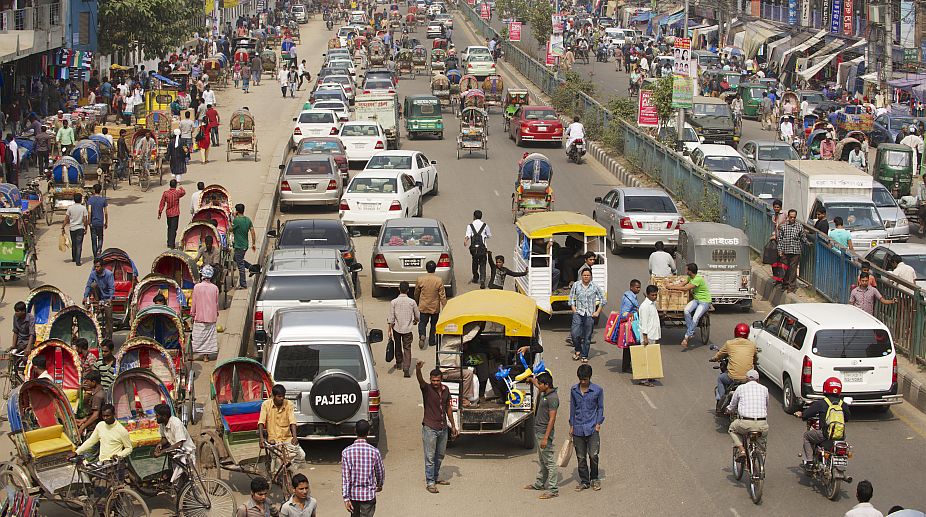Bangladesh has been named one of the six emerging Asian economies where growth gathered momentum.
Bangladesh has been named one of the six emerging Asian economies where growth gathered momentum, with the other five being India, Indonesia, Myanmar, the Philippines and Vietnam.
“The People's Republic of China is transitioning to more moderate and balanced growth. But growth is gathering momentum in countries such as Bangladesh, India, Indonesia, Myanmar, the Philippines, and Vietnam,” Asian Development Bank President Takehiko Nakao said yesterday.
He was speaking at the formal launch of the ADB Board of Governors annual meeting at Pacifico Yokohama, one of Japan's biggest conference facilities, under the theme “Building Together the Prosperity of Asia”.
Some 6,000 government officials, academics, business officers, civil society representatives and members of the media were present.
The annual meeting is also a celebration of the ADB's 50 years of development work in Asia and the Pacific.
Japan's Crown Prince Kotaishi Naruhito Shinno and Deputy Prime Minister and Finance Minister Taro Aso graced the opening session of the four-day event that began on Thursday.
The meeting will end today with hundreds of delegates from the 67 ADB member countries finalising strategies for a more prosperous Asia by 2030.
ADB President Nakao stressed the need for more investments in infrastructure to support continued growth in the Asia-Pacific region and combat climate change.
“Today, we begin a new chapter in the history of ADB and the region. Building on our achievements of the past 50 years, ADB will continue to work together with our partners to build a more vibrant, inclusive, and sustainable Asia and the Pacific,” he said.
The ADB president said investment in infrastructure would remain a priority for the bank as it prepares a new long-term “Strategy 2030” to respond to rapid regional changes.
“While the region has done remarkably well, we can't be complacent. Several challenges remain and new ones have emerged in Asia. About 330 million people still live in absolute poverty on less than $1.90 income a day.”
Noting that implementation of the Sustainable Development Goals and the climate actions agreed at COP21 in 2015 are collective priorities for Asian economies, Nakao said there were new challenges from urbanisation, aging and widening inequalities.
He also touched upon five priority areas of the Manila-based lending agency such as supporting infrastructure development through incorporating more advanced technologies, prioritising social sectors, further promoting gender equality, stepping up efforts to mobilise private resources for development and prioritising Strategy 2030 under which reforms would continue in the ADB itself.
Investment in infrastructure will be an ADB priority under Strategy 2030, including enhanced support for infrastructure projects that incorporate advanced technologies, the ADB chief said.
“Asia will need $1.7 trillion per year in investments in power, transport, telecommunications, and water through 2030.”
Support for social sectors, especially health and education, is a second ADB priority area under Strategy 2030. For this, Nakao said, the ADB “will support universal healthcare systems and cross-border initiatives to combat communicable diseases such as malaria, tuberculosis, and HIV.”
According to the ADB president, the bank will design projects to help women and girls secure higher skills, better health, more jobs, and a larger voice in decision-making.
Nakao highlighted the bank's progress in 2016. He noted that total ADB operations last year, including cofinancing and technical assistance, reached $31.7 billion. The bank's loan and grant approvals reached a record high of $17.5 billion, a 9 percent increase from the previous year. Besides, climate finance reached $3.7 billion, up from $2.6 billion in 2015.
Cofinancing with public and private partners increased to $13.9 billion. This includes ADB's first two cofinanced projects with the Asian Infrastructure Investment Bank for roads in Pakistan and a natural gas project in Bangladesh.
Crown Prince of Japan Naruhito said over 300 million people were still living in poverty in this region and poverty reduction through sustainable and inclusive growth remains an important agenda to his country.
“The region is also faced with a range of challenges, such as developing infrastructure including power supply networks, and transportation facilities, as well as addressing natural disasters and climate change. Against this backdrop, I hope that the bank will play an important role in addressing these issues,” he added.
Deputy Prime Minister and Finance Minister of Japan Taro Aso mentioned that the infrastructure needs in Asia were getting larger both in terms of quality and quantity due to the economic development.
“The bank's recent estimates point to huge infrastructure needs in developing Asia, amounting to $26 trillion over the next 15 years. Against this backdrop, I would expect the bank to continue to promote infrastructure development, and to further mobilise private sector financing including through PPPs.”
He said Japan would remain committed to working hard for the development of the Asia-Pacific region, in close cooperation with the ADB.
The ADB has decided to set up a trust fund to promote the integration of high-level technology (HLT) and innovative solutions in the design and implementation of its projects.
Japanese deputy premier Taro Aso, also the chair of ADB Board of Governors, yesterday announced that his country would provide $40 million over the next two years.
The HLT fund will provide grants for technical assistance and investment projects, and recruitment of technology experts to promote the integration of HLT and innovative solutions throughout the project cycle of the ADB-financed and administered projects.
The fund will encourage more widespread adoption of HLT to address development challenges in the ADB's developing member countries.
“Japan has been promoting quality infrastructure in Asia, collaborating closely with ADB. To further strengthen the partnership, Japan will provide $40 million over 2 years to the new trust fund for HLT,” said Taro Aso.
The HLT fund will be operational by July. It will support a broad range of technologies and innovative solutions that are either new or need scaling-up.
The fund may be used for feasibility studies, detailed designs, knowledge transfer and policy.
(The Daily Star)










